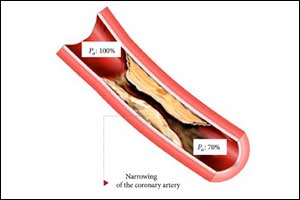- Home
- Editorial
- News
- Practice Guidelines
- Anesthesiology Guidelines
- Cancer Guidelines
- Cardiac Sciences Guidelines
- Critical Care Guidelines
- Dentistry Guidelines
- Dermatology Guidelines
- Diabetes and Endo Guidelines
- Diagnostics Guidelines
- ENT Guidelines
- Featured Practice Guidelines
- Gastroenterology Guidelines
- Geriatrics Guidelines
- Medicine Guidelines
- Nephrology Guidelines
- Neurosciences Guidelines
- Obs and Gynae Guidelines
- Ophthalmology Guidelines
- Orthopaedics Guidelines
- Paediatrics Guidelines
- Psychiatry Guidelines
- Pulmonology Guidelines
- Radiology Guidelines
- Surgery Guidelines
- Urology Guidelines
iFR safer & less expensive than FFR for patients needing PCI

In order to evaluate patients for blockages in the heart, FFR & iFR are two technologies to aid for having a good road map of the vascular terrain before inserting stents to clear the blockage.Both the technologies have been used with equal success in the past.In a new study a study presented at the American College of Cardiology annual meeting by Duke cardiologists it has been shown that Non-invasive instantaneous wave-free ratio (iFR), was less expensive than an older technology known as fractional flow reserve (FFR), which requires injection of a drug that dilates the blood vessels, adding complexity, expense, and potential risk.
A study called DEFINE-FLAIR compared iFR to FFR and reported last year that the different technologies performed similarly for clinical outcomes, with iFR actually resulting in fewer symptoms for patients before, during and after the procedure.
In the current study, the question was whether iFR might be less expensive than FFR, which would eliminate another potential barrier to its use. Using the DEFINE-FLAIR data for their cost analysis, Patel and colleagues found that the average cost of the catheterization procedure was lower in the iFR group than in the FFR group, at $2,489 vs. $2,564.
Dr.Manesh Patel chief of the Division of Cardiology at Duke and member of the Duke Clinical Research Institute along with his colleagues conducted a study of nearly 2,500 heart patients.The researchers found that a new technology, non-invasive instantaneous wave-free ratio (iFR), was less expensive than an older technology known as fractional flow reserve (FFR), which requires injection of a drug that dilates the blood vessels, adding complexity, expense and potential risk.
Patel said iFR has in recent years emerged as an alternative in recent years. Unlike FFR -- which requires administration of the drug adenosine to maximally vasodilate the heart muscle and then measure the differences in a pressure along a blocked or narrowed artery -- iFR relies on measuring the pressure during a specific point in the cardiac cycle.
"There are clear clinical advantages to using these technologies to map coronary physiology prior to coronary revascularization procedures, because they provide an accurate evaluation of the blockage, as well how best to treat it," said senior researcher Manesh Patel, M.D., chief of the Division of Cardiology at Duke and member of the Duke Clinical Research Institute. "Unfortunately, there has been resistance to performing FFR in part due to the use of the vasodilator drug, so finding a good alternative is an important clinical step."
The iFR procedure was less costly because it took less time, didn't require the vasodilation drug, and resulted in lower percutaneous coronary intervention rates.
Patients in the iFR group also had significantly fewer coronary artery bypass graft procedures and fewer subsequent revascularisations than those in the FFR group.
Overall, health care costs were estimated at $7,442 with iFR and $8,243 with FFR, for an unadjusted saving of $801 per patient.
"Either of these two technologies improve outcomes for patients with coronary disease, but our study shows that iFR has cost savings with similar outcomes," Patel said. "This should help remove barriers to the more widespread clinical adoption of a technology that can provide physicians with a better conception of patients' unique coronary physiology."

Disclaimer: This site is primarily intended for healthcare professionals. Any content/information on this website does not replace the advice of medical and/or health professionals and should not be construed as medical/diagnostic advice/endorsement or prescription. Use of this site is subject to our terms of use, privacy policy, advertisement policy. © 2020 Minerva Medical Treatment Pvt Ltd